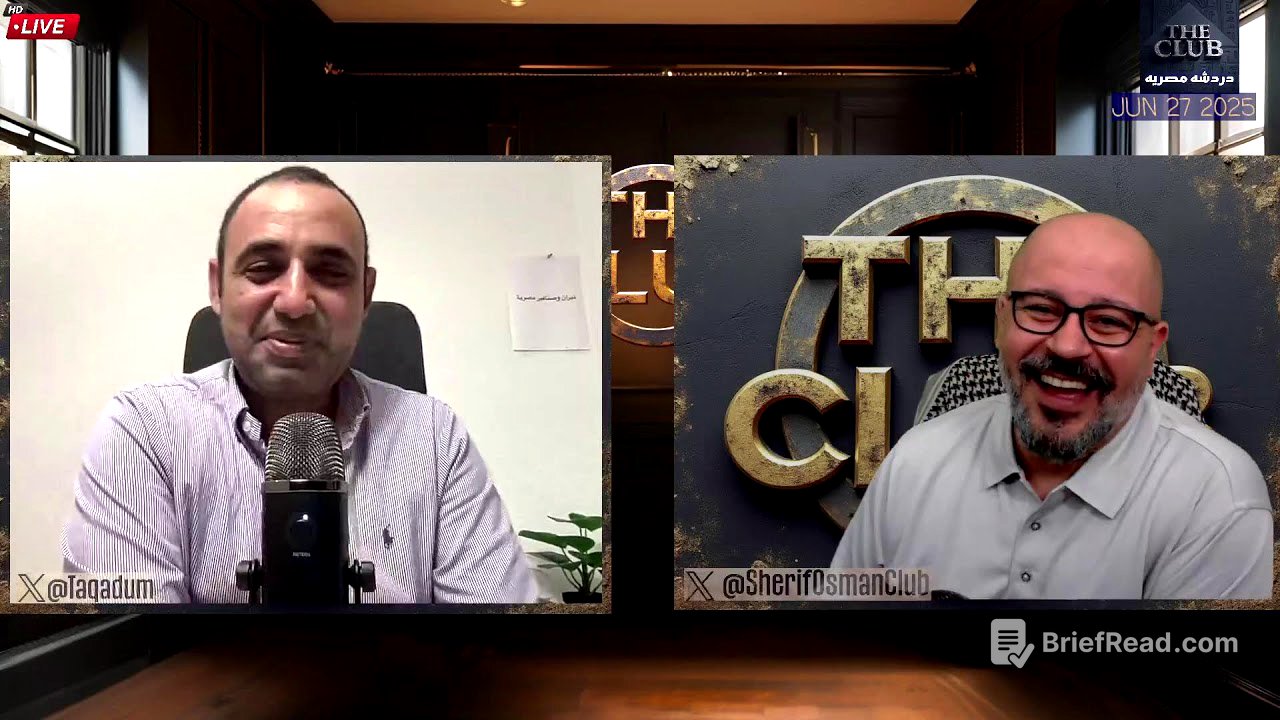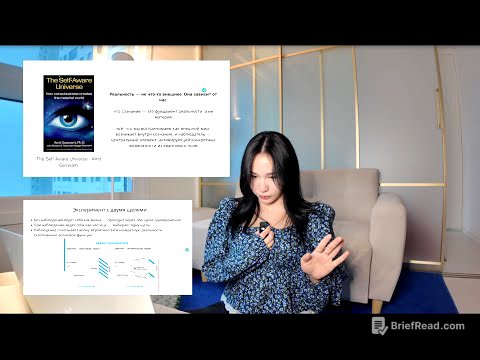TLDR;
This YouTube video features a discussion between Sherif Osman and a guest, focusing on Egyptian politics, regional dynamics, and the role of external powers. They analyze the current state of Egypt under Sisi, comparing it to the British occupation era, and discuss the influence of figures like Mohammed bin Zayed. The conversation also covers the complexities of the Iran-Israel conflict, potential future alliances, and the internal challenges facing America. They propose a unique form of protest for Egyptians and touch on the importance of hope and organization.
- Analysis of Egyptian politics under Sisi and comparison to British occupation.
- Discussion of regional dynamics, including the influence of Iran, Israel, and Turkey.
- Proposal for a unique form of protest involving abstaining from Friday prayers.
Introduction and Welcoming Guests [0:00]
Sherif Osman begins the live podcast, welcoming viewers and regular contributors such as Mustafa Amer and Najwa Al-Bassel. He acknowledges the presence of channel administrators and moderators like Lucifer Munawar, who help maintain the cleanliness of the timeline. Sherif expresses gratitude to the viewers for their support and mentions that the podcast will feature Egyptian chat and discussions on various topics.
Microphone Discussion and Channel Promotion [2:08]
Sherif and a guest discuss the quality of their microphones, noting their clarity and effectiveness. The guest expresses his intention to use the same microphone for his own channel and asks Sherif to include a link to his channel in the description box. Sherif agrees to promote the channel and also mentions a fundraising group, offering to include both links in the description for viewers to access.
Language Skills and International Experiences [2:58]
Sherif and his guests share anecdotes about their language skills and experiences abroad. They discuss German, Hebrew, French, and other languages they have learned. Sherif recalls his time in Germany and Austria, while others share stories about their interactions with German speakers. He mentions his proficiency in Hebrew, which he learned in college for electronic warfare purposes.
YouTube Shield and Appreciation [9:22]
Sherif expresses his gratitude for receiving the YouTube shield for reaching 100,000 subscribers. He acknowledges Mike Hussein for donating to the channel and shares his excitement about the achievement. Sherif emphasizes that the shield represents all the subscribers who seek truth and a civil state. He promises to display the shield in future shows as a symbol of pride.
Analysis of Sisi's Regime and Egyptian Politics [13:52]
The discussion shifts to an analysis of Sisi's regime and the political situation in Egypt. The guest argues that the army controls the country and that change is unlikely unless people take to the streets. He notes Sisi's fear of public movements and his efforts to suppress any opposition. The guest compares the current situation to the British occupation era, highlighting the large number of Egyptians in exile and the use of similar oppressive tactics.
Economic Issues and Corruption in Egypt [21:00]
The conversation touches on economic issues and corruption in Egypt. The guest mentions the administrative capital company's debts of $42 billion and questions where the money has gone. He suggests that the country is being systematically destroyed and sold off piece by piece. The guest points out the increasing wealth disparity, with some becoming billionaires while others struggle to afford basic necessities.
Geopolitical Analysis: Tiran, Sanafir, and Regional Control [23:11]
The discussion shifts to geopolitical analysis, focusing on the Tiran and Sanafir islands and regional control. The guest argues that the project in the area is just beginning and is linked to the Abraham Accords. He suggests that giving up the islands is part of a plan to control the Red Sea and exert influence in Sudan. The guest criticizes the rise of new mercenaries and those who sell themselves out for personal gain.
Alliances and Regional Projects [44:54]
The discussion shifts to regional projects, particularly the Turkish and Iranian projects. The guest argues that Egypt is the only country capable of confronting these projects. He suggests that if the Iranian regime falls, Turkey would be the first to suffer due to the potential creation of a Kurdish state. The guest also warns that the Gulf countries would be affected and might face regime collapses.
Iran-Israel Conflict and Regional Power Dynamics [49:30]
The conversation focuses on the Iran-Israel conflict and regional power dynamics. The guest argues that Iran emerged victorious from the recent conflict, strengthening its position in the region. He suggests that Iran's nuclear facilities were not harmed and that the country's missile program is still developing. The guest also notes that the US failed to achieve its objectives in the conflict.
American Influence and Regional Alliances [59:25]
The discussion shifts to American influence and regional alliances. The guest argues that the Gulf countries are made of glass and that their security doctrine relies on American protection. He suggests that the recent events will make the Gulf elites rethink their security arrangements and potentially turn to Turkey for protection. The guest also criticizes Egypt for not taking advantage of opportunities to regain its regional theme.
Historical Context and Egypt's Role [1:02:47]
The conversation provides historical context, comparing Egypt's current role to its position during Mubarak's era. The guest argues that Mubarak, despite his corruption, presented Egypt well on the international stage. He criticizes the current regime for its weak statements and absence from regional affairs. The guest also discusses the historical guilt complex in Germany and the challenges faced by Egyptians working in international organizations.
Proposed Protest: Abstaining from Friday Prayers [1:56:49]
The guest proposes a unique form of protest for Egyptians: abstaining from Friday prayers. He suggests that people should pray at home instead of attending mosques where intelligence-affiliated sheikhs deliver lectures. The guest argues that this would be a safe and effective way to unite people and express their dissatisfaction with the regime. He believes that it would disrupt the regime's control over religious discourse and create a collective negative action.
Closing Remarks and Gratitude [2:19:04]
Sherif expresses his gratitude for the guest's continuous support and insightful vision. He thanks the audience for their participation and hopes to see Egypt in a better state one day. The guest reiterates his desire to return to Egypt and expresses his appreciation for the opportunity to discuss these important issues. They acknowledge the challenges facing Egypt and emphasize the importance of hope and organization.





![Tor Browser - How to Use, Tutorial for Beginners in 6 MINS! [ COMPLETE ]](https://wm-img.halpindev.com/p-briefread_c-10_b-10/urlb/aHR0cDovL2ltZy55b3V0dWJlLmNvbS92aS96aTJFWHl0OWlyay9ocWRlZmF1bHQuanBn.jpg)



